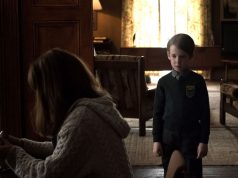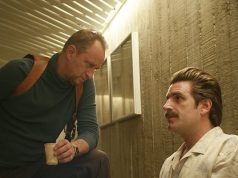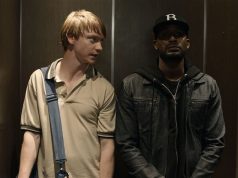I feel bad for the poor souls who saw “Silent Light” without knowing anything about it first and came away hating it. They were probably expecting a movie that was, well, normal. You know, with a plot and stuff. A movie where things happen.
“Silent Light” is not that kind of movie. It is exceptionally slow and deliberate, with long, unbroken takes that often contain very little action at all. A man drives his truck away from his farmhouse and down a long dirt road to the highway — and we don’t cut away to another scene until the truck is a speck in the distance. Thirty seconds of watching a truck drive away, where a more conventional movie would have cut the shot after three or four seconds.
I explain all this up front because I think it’s crucial you understand what sort of evening you’re in for if you choose to watch “Silent Light.” If a very slow, 127-minute-long movie containing a plot that could be told in 10 minutes sounds unappealing to you, then by all means, skip it. No one will think less of you.
But if you can sometimes be caught up in the world of a well-crafted movie and enjoy the way it feels as opposed to the story it tells, then you may find it rewarding. Personally, I loved it. Some of the cinematography is breathtakingly beautiful, and there are moments of intense emotion that absolutely would not have worked in a “faster” movie. Certain things require more time and patience to be effective.
Written and director by Mexico’s Carlos Reygadas (“Battle in Heaven”), the film is set in a Mennonite community in northern Mexico, where a dialect of German known as Plautdietsch is spoken. (It is reportedly the first movie ever filmed in that language.) Johan (Cornelio Wall), his wife Esther (Miriam Toews), and their numerous young children live a simple life on a small dairy farm. Their world is full of silence and calm, but there is turmoil in Johan’s soul: He is cheating on Esther with a woman named Marianne (Maria Pankratz).
Johan has told Esther about the affair and has evidently tried to break it off, but the flesh is weak. He tells his friend Zacarias (Jacobo Klassen) that he loves both women. Certainly Marianne is no younger or prettier than Esther; Johan isn’t just having a midlife crisis here. His feelings are deep. Zacarias says maybe it’s his destiny to be caught in the middle like this, but Johan rejects that. “A brave man makes his destiny with what he’s got,” he says.
Johan’s father — likewise a taciturn, old-world fellow, and a Mennonite preacher — says it’s the devil’s work. His point of view is rather the opposite of Johan’s. Where the son believes he can make his own destiny, the father says, “It was all written beforehand.”
And that is the scenario. When the surprises come later in the story — truly unforeseeable, even baffling, events — they occur as methodically and plainly as everything else; nothing in the film is ever underlined or emphasized. The camera is frequently in motion, but always slowly, carefully, like an omniscient being. It is as unrushed as the characters.
And I think that gets at what Reygadas had in mind, and why he shot the film this way, with so much silence and apparent uneventfulness. The opening shot is an impossibly glorious sunrise, captured more or less in real time by cinematographer Alexis Zabe (who generally uses only natural lighting, too, as befits the Mennonites’ simple lifestyle). The shot is long and quiet, perfectly setting the tone for the film. We are meant to be drawn in to this peaceful little world, to feel what the characters feel, to view the world the way they do.
In that way, though the film is certainly slow, I don’t think it’s boring. “Boring,” to me, is when a filmmaker thinks he has made something interesting but in fact has not. In this case, Reygadas has clearly told the story a certain way on purpose — if it is “boring,” it is intentionally that way. Ideally, if the film is effective (as it was for me), we are happy to enjoy the silences, to meditate on the striking visual images, and to share in the thoughts of the characters. It’s not so much a movie as an experience.
B+ (2 hrs., 7 min.; in the German dialect of Plautdietsch with subtitles; )





